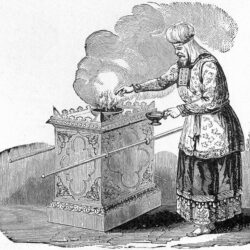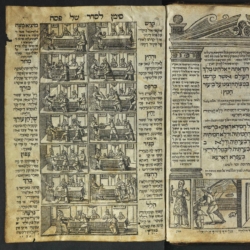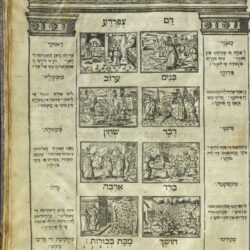Some uniquely Judeo-Italian features of the language include:
☞ The term “Ded” — referring to God — which probably derives from the Latin “Deus.”
☞ The term “Domedet” — referring to the divine name Yod-He-Vav-He — which probably comes from Latin “Dominus Deus.” These two terms are never found in non-Jewish Italian dialects.
☞ The usage of “lo” as an all-purpose singular masculine definite article, even in scenarios where most Italian dialects would use “il” or “’l”
☞ The use of the vowel sheva to mark /e/ and /ɛ/.
Note: “The CAUSE” is used to translate the Divine Name YHVH, based on the philosophical idea of God as the Prime Mover and on the interpretation of the Name as a causative form of the copula – “causes to be.” This translation also uses the plural pronoun to refer to God as a pluralis majestatis, and to avoid the implications of God being assigned a gender. (Find Ibn Ezra’s commentary on Genesis 1:1 for a discussion of the pluralis majestatis when referring to God.) All divine referents (pronouns, epithets, names) are rendered in unicase.
| Source (Hebrew) | Translation (Romanized Judeo-Italian) | Translation (Judeo-Italian) | Translation (Italian) | Translation (English) |
|---|---|---|---|---|
אֵין כֵּאלֹהֵֽינוּ אֵין כַּאדוֹנֵֽינוּ אֵין כְּמַלְכֵּֽנוּ אֵין כְּמוֹשִׁיעֵֽנוּ |
Non è come lo Ded nostro! Non è come lo Segnore nostro! Non è come lo Re nostro! Non è come lo Salvatore nostro! |
נוֹן אֵי קוֹמְי לוֹדֵּיד נוֹשְׁטְרוֹ נוֹן אֵי קוֹמְי לוֹסְנְייוֹרְי נוֹשְׁטְרוֹ נוֹן אֵי קוֹמְי לוֹרְיְי נוֹשְׁטְרוֹ נוֹן אֵי קוֹמְי לוֹסַלְװָאטוֹרְי נוֹשְׁטְרוֹ |
Nessuno è come il Dio nostro. Nessuno è come il Signore nostro. Nessuno è come il Re nostro. Nessuno è come il Salvatore nostro. |
None is like our God! None is like our Lord! None is like our Sovereign! None is like our Savior! |
מִי כֵאלֹהֵֽינוּ מִי כַּאדוֹנֵֽינוּ מִי כְמַלְכֵּֽנוּ מִי כְמוֹשִׁיעֵֽנוּ |
Chi è come lo Ded nostro? Chi è come lo Segnore nostro? Chi è come lo Re nostro? Chi è come lo Salvatore nostro? |
קִי אֵי קוֹמְי לוֹדֵּיד נוֹשְׁטְרוֹ קִי אֵי קוֹמְי לוֹסְנְייוֹרְי נוֹשְׁטְרוֹ קִי אֵי קוֹמְי לוֹרְיְי נוֹשְׁטְרוֹ קִי אֵי קוֹמְי לוֹסַלְװָאטוֹרְי נוֹשְׁטְרוֹ |
Chi è come il Dio nostro? Chi è come il Signore nostro? Chi è come il Re nostro? Chi è come il Salvatore nostro? |
Who is like our God? Who is like our Lord? Who is like our Sovereign? Who is like our Savior? |
נוֹדֶה לֵאלֹהֵֽינוּ נוֹדֶה לַאדוֹנֵֽינוּ נוֹדֶה לְמַלְכֵּֽנוּ נוֹדֶה לְמוֹשִׁיעֵֽנוּ |
Laudiemo allo Ded nostro! Laudiemo allo Segnore nostro! Laudiemo allo Re nostro! Laudiemo allo Salvatore nostro! |
לַאוֹדְימוֹ אַלוֹדֵּיד נוֹשְׁטְרוֹ לַאוֹדְימוֹ אַלוֹסְנְייוֹרְי נוֹשְׁטְרוֹ לַאוֹדְימוֹ אַלוֹרְיְי נוֹשְׁטְרוֹ לַאוֹדְימוֹ אַלוֹסַלְװָאטוֹרְי נוֹשְׁטְרוֹ |
Lodiámo al Dio nostro! Lodiámo al Signore nostro! Lodiámo al Re nostro! Lodiámo al Salvatore nostro! |
Let us laud our God! Let us laud our Lord! Let us laud our Sovereign! Let us laud our Savior! |
אַתָּה הוּא אֱלֹהֵֽינוּ אַתָּה הוּא אֲדוֹנֵֽינוּ אַתָּה הוּא מַלְכֵּֽנוּ אַתָּה הוּא מוֹשִׁיעֵֽנוּ |
Tu si lo Ded nostro! Tu si lo Segnore nostro! Tu si lo Re nostro! Tu si lo Salvatore nostro! |
טוּ סִי לוֹדֵּיד נוֹשְׁטְרוֹ טוּ סִי לוֹסְנְייוֹרְי נוֹשְׁטְרוֹ טוּ סִי לוֹרְיְי נוֹשְׁטְרוֹ טוּ סִי לוֹסַלְװָאטוֹרְי נוֹשְׁטְרוֹ |
Tu sei il Dio nostro! Tu sei il Signore nostro! Tu sei il Re nostro! Tu sei il Salvatore nostro! |
You are our God! You are our Lord! You are our Sovereign! You are our Savior! |
יְהֹוָ֥ה חָפֵ֖ץ לְמַ֣עַן צִדְק֑וֹ יַגְדִּ֥יל תּוֹרָ֖ה וְיַאְדִּֽיר׃ |
Domedéd volentà per la giustizia soa engrandisca la Torà e enfortisca. |
דוֹמְדֵּיד בֿוֹלֵינְטָה פְיר לַיוּשְׁטִיצִיאָה סוֹאָה אְינְגְרַנִיסְקָה לַתוֹרָה אְינְפֿוֹרְטִיסְקָה |
L’Eterno s’è volùto, per la sua giustizia, di rendere la Torà grande e magnifica; |
The CAUSE wanted for Their justice’s sake to greaten and strengthen the Torah. |
The mantra-like piyyut “Ein kEloheinu,” a praise of God’s attributes and uniqueness featuring incremental repetition, is found in siddurim as far back as the siddur of Rav Amram, and may date back to the Hekhalot literature. [In the variations found in the Siddur Rav Amram and in genizah fragments, the order of the stanzas differs from how it is currently read today. –ANV

“אֵין כֵּאלֹהֵֽינוּ | Non È Come lo Ded Nostro (נוֹן אֵי קוֹמְי לוֹדֵּיד נוֹשְׁטְרוֹ) — a Renaissance Judeo-Italian translation of Ein Keloheinu (1483)” is shared through the Open Siddur Project with a Creative Commons Attribution-ShareAlike 4.0 International copyleft license.










Leave a Reply